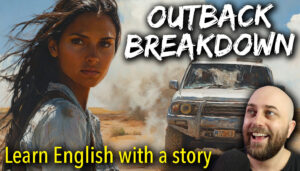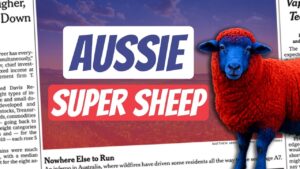
AE 1303 - The Goss
Grey Nomads & Retirement in Australia
Learn Australian English by listening to this episode of The Goss!
These are conversations with my old man Ian Smissen for you to learn more about Australian culture, news, and current affairs.

In today's episode...
G’day, listeners! Ever wondered what it’s like to retire in Australia?
In this episode of Aussie English, Dad and I have a yarn about the ins and outs of superannuation, pensions, and the whole retirement shebang.
We touch on everything from the history of retirement in Oz to the impact of the 2008 financial crisis on our savings.
We even discuss the “grey nomad” lifestyle and the challenges of housing affordability. Plus, we share a few laughs along the way, reminiscing about our experiences and offering some insights into retirement planning.
So if you’re keen to learn more about retirement Down Under, chuck on your headphones and give this episode a listen. It’s a ripper!
** Want to wear the kookaburra shirt? **
Get yours here at https://aussieenglish.com.au/shirt
Improve your listening skills today – listen, play, & pause this episode – and start speaking like a native English speaker!
Listen to today's episode!
This is the FREE podcast player. You can fast-forward and rewind easily as well as slow down or speed up the audio to suit your level.
If you’d like to use the Premium Podcast Player as well as get the downloadable transcripts, audio files, and videos for episodes, you can get instant access by joining the Premium Podcast membership here.
Get more out of every episode!

Premium Podcast members get access to...
- All 900+ podcast episodes including member-only episodes
- Member-only episode video lessons
- Downloadable transcript PDFs & audio files for every episode

Recent Episodes:


AE 1372 – 18 Weird Things That Shock Tourists in Japan | Japanese Culture Shock

AE 1371 – The Goss: How Dad Self-Published a Book in Australia

AE 1370 – Learn English with a Short Story: Outback Breakdown

AE 1369 – Interview: A Silly Conversation With My Son Noah Smissen
AE 1368 – The Goss: What Are Some Australian Norms?

AE 1367 – Top 10 Aussie Movies

AE 1366 – The Goss: Aussie Farmer is Breeding Super Sheep

AE 1365 – Pete’s 2c: What Are Some Great Aussie TV Series to Watch?

Share

Join my 5-Day FREE English Course!
Complete this 5-day course and learn how to study effectively with podcasts in order to level up your English quickly whilst having fun!


Want to improve a specific area of your English quickly and enjoyably?
Check out my series of Aussie English Courses.
English pronunciation, use of phrasal verbs, spoken English, and listening skills!

Want to improve a specific area of your English quickly and enjoyably?
Check out my series of Aussie English Courses.
English pronunciation, use of phrasal verbs, spoken English, and listening skills!
Leave a comment below & practice your English!







Responses